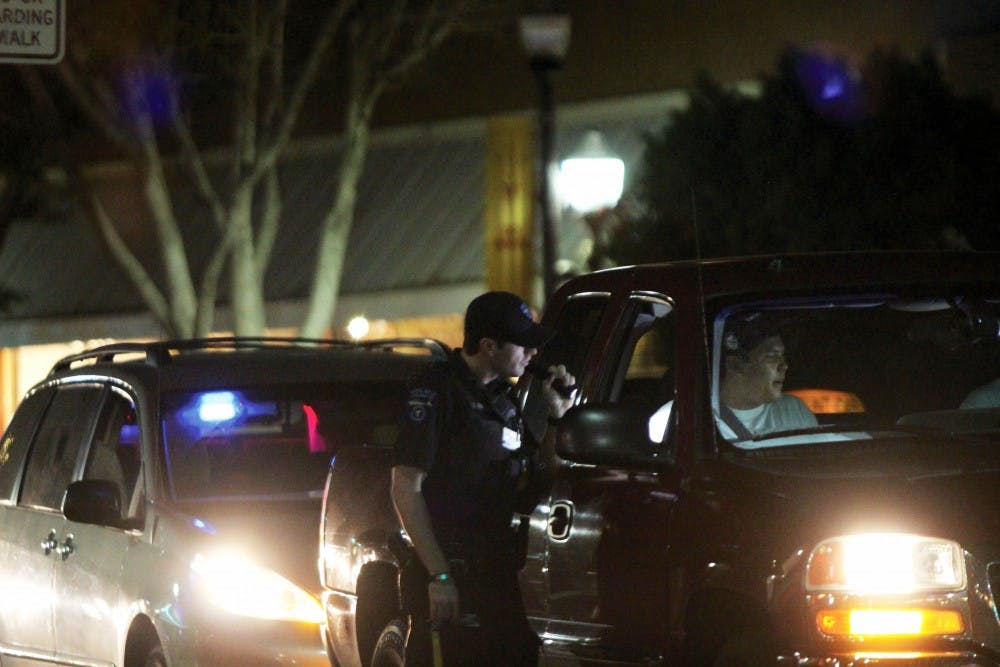 A police officer in Tempe makes a routine stop near Mill Avenue on a Saturday night. Tempe Police have been ramping up their patrols this fall, using inconspicuous vehicles to attract less attention. (Photo by Dominic Valente)
A police officer in Tempe makes a routine stop near Mill Avenue on a Saturday night. Tempe Police have been ramping up their patrols this fall, using inconspicuous vehicles to attract less attention. (Photo by Dominic Valente)
It’s been barely more than a month since the city of Tempe’s harsher policy on loud noise disturbances and parties took effect.
Since then, the city’s police force has been busy with several operations aimed at crime prevention and back-to-school safety, which may have garnered help from the new law.
Tempe Police Sgt. Mike Pooley said the ordinance, which went into effect Aug. 1, changed the way police handle loud noise calls and out-of-control parties.
“What the ordinance says is that we can go out there and if we got several people that are completely out-of-control, we can fine them,” he said. “It’s a pretty aggressive ordinance that was put into place.”
Detective Jeff Lane with Tempe Police’s Crime Prevention Unit said the changes made to city code allow officers to immediately take action and issue citations when an officer is called to a loud party.
“If we have to come the first time and we look at (a party) and can hear it a hundred yards away, and there’s trash, there’s litter (and) there’s urinating in public," he said. "We’re going to cite the responsible person."
The citations can be $250 or more on the first offense and can reach up to $1,500.
Tempe Police Detective Dan Brown said the new ordinance no longer requires officers to give written warnings.
“Last year, we were mandated to give a written warning first, (and) that’s no longer a part of the law," Brown said. "Now if there is a violation and we deem it’s necessary, we can cite on the spot, but we can still respond and (say), ‘This is not unreasonable in our opinion.'"
In the past, warnings notified residents that if officers had to respond to the same place within 90 days for a subsequent party call, officers could then begin citing residents.
Brown stressed that not every call will immediately result in citations.
“Officers still have discretion,” he said.
Pooley said the change also makes it easier for police to still issue citations even when people at a party do not answer the door.
“If people didn’t answer the door, it was hard for us to do any enforcement at all,” he said. “Now if people don’t answer the door, this is where the homeowner can be cited. Anyone that lives in the apartment or home can be cited, and we leave a ticket on the door.”
If a resident or owner is issued a ticket and they believe it was unfairly given, Pooley said, they always have the option to contest the citation.
Digital culture sophomore James Lee, who recently transferred to ASU from Illinois, said he is concerned about whether leaving the decision up to officers to determine if a party should be broken up is the best method of enforcement.
“It just all depends on, I guess, what kind of night (the officer’s) having, and I don’t think that’s fair that it should be up to his discretion,” Lee said. “It should be a certain amount of complaints, I feel like it shouldn’t be solely up to the cop. There should be a second opinion somewhere.”
Lee also said he did not like that there is no longer a required warning before officers could begin issuing citations.
“After one fair warning, then I think it’s fair game,” he said. “But I don’t think that without a warning they can just walk in there and give them a ticket under that cop’s discretion is cool at all.”
According to a 21-page report released by Tempe Police last month, loud parties are the fifth most common call for service.
Besides the frequency of calls, several high-profile incidences in the last year involving parties have raised concern by the city of Tempe and its police, such as the drowning of student Jack Culolias after he attended a fraternity event where he was seen drinking underage.
The report also states that while loud parties do not cause additional or more serious crimes, there is a geographic correlation between the areas that receive the highest number of loud party calls and the areas with more serious crime.
Pooley said this area is known as the loud party corridor.
“There’s an area just east of Rural Road and (the) Apache Boulevard area where we were getting large amounts of calls for service,” he said.
According to Tempe Police, 43 percent of loud party calls happen within one mile of the Tempe campus, and the department spends approximately $127,000 annually in resources responding to loud parties.
While the area directly around the campus is one of the most densely populated areas in the city, other heavily populated parts do not receive a comparable number of loud party calls, according to the report.
The law will continue to be tested over the next few months, particularly during October, the busiest month for Tempe officers.
According to Tempe Police, officers in October receive an average of 663 calls compared to the normal monthly average of 500.
Pooley said the work officers are doing now should be a future indication of how officers will handle months such as October, which has ASU’s fall break, Halloween and Homecoming.
“We’re trying to set the tone right now, so when those months do come, that people will know what the new ordinance is,” he said. “We’re hoping that this is going to help curb the problem.”
Whether the change in city code has had its intended affect remains to be seen.
“It is hard to tell if this is having an effect right now, just because it is so new,” said Pooley.
He added that there are no plans to change or alter the law, but Tempe Police expects the number of calls to officers as a result of parties to reduce.
Reach the reporter at mark.remillard@asu.edu or follow him on Twitter @markjremillard




